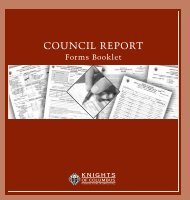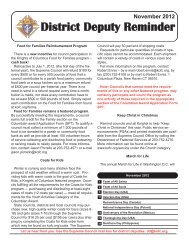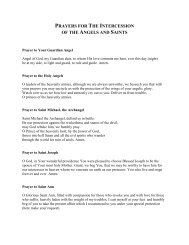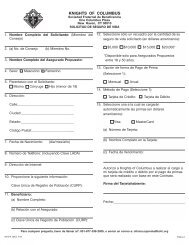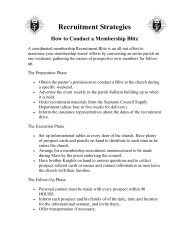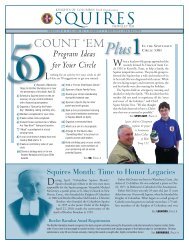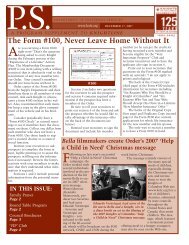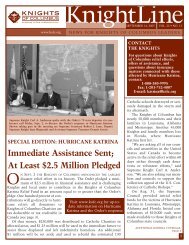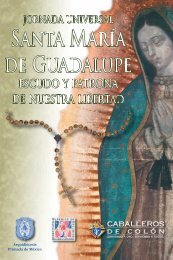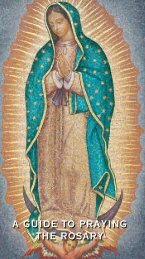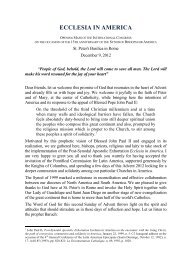CATHOLIC WORD BOOK - Knights of Columbus, Supreme Council
CATHOLIC WORD BOOK - Knights of Columbus, Supreme Council
CATHOLIC WORD BOOK - Knights of Columbus, Supreme Council
Create successful ePaper yourself
Turn your PDF publications into a flip-book with our unique Google optimized e-Paper software.
Primary Option: The life choice <strong>of</strong> a person<br />
for or against God which shapes the basic<br />
orientation <strong>of</strong> moral conduct. A primary<br />
option for God does not preclude the<br />
possibility <strong>of</strong> serious sin.<br />
Prior: A superior or an assistant to an abbot<br />
in a monastery.<br />
Privilege: A favor, an exemption from the<br />
obligation <strong>of</strong> a law. Privileges <strong>of</strong> various<br />
kinds, with respect to ecclesiastical laws,<br />
are granted by the pope, departments <strong>of</strong><br />
the Roman Curia and other competent<br />
authority in the Church.<br />
Probabiliorism: The moral system<br />
asserting that the more probable opinion<br />
<strong>of</strong> a varied set <strong>of</strong> acceptable positions<br />
regarding the binding character <strong>of</strong> a law<br />
should be accepted. If the reasons for being<br />
free from a law are more probably true, one<br />
is freed from the law’s obligations.<br />
Probabiliorism, however, maintained that<br />
if it was probable that the law did not<br />
bind, one still had to follow it unless it was<br />
more probable that the law did not bind.<br />
Probabilism: A moral system for use in<br />
cases <strong>of</strong> conscience which involve the<br />
obligation <strong>of</strong> doubtful laws. There is a<br />
general principle that a doubtful law does<br />
not bind. Probabilism, therefore, teaches<br />
that it is permissible to follow an opinion<br />
favoring liberty, provided the opinion is<br />
certainly and solidly probable.<br />
Probabilism may not be invoked when<br />
there is question <strong>of</strong>: a certain law or the<br />
certain obligation <strong>of</strong> a law; the certain<br />
right <strong>of</strong> another party; the validity <strong>of</strong> an<br />
action; something which is necessary for<br />
salvation.<br />
-56-<br />
Pro Cathedral: A church used as a<br />
cathedral.<br />
Promoter <strong>of</strong> the Faith (Promotor fidei): An<br />
<strong>of</strong>ficial <strong>of</strong> the Congregation for the Causes<br />
<strong>of</strong> Saints, whose role in beatification and<br />
canonization procedures is to establish<br />
beyond reasonable doubt the validity <strong>of</strong><br />
evidence regarding the holiness <strong>of</strong><br />
prospective saints and miracles attributed<br />
to their intercession.<br />
Prophecy: (1) The communication <strong>of</strong><br />
divine revelation by inspired<br />
intermediaries, called prophets, between<br />
God and his people. Old Testament<br />
prophecy was unique in its origin and<br />
because <strong>of</strong> its ethical and religious content,<br />
which included disclosure <strong>of</strong> the saving<br />
will <strong>of</strong> Yahweh for the people, moral<br />
censures and warnings <strong>of</strong> divine<br />
punishment because <strong>of</strong> sin and violations<br />
<strong>of</strong> the Law and Covenant, in the form <strong>of</strong><br />
promises, admonitions, reproaches and<br />
threats. Although Moses and other earlier<br />
figures are called prophets, the period <strong>of</strong><br />
prophecy is generally dated from the early<br />
years <strong>of</strong> the monarchy to about 100 years<br />
after the Babylonian Exile. From that time<br />
on, the written Law and its interpreters<br />
supplanted the prophets as guides <strong>of</strong> the<br />
people. Old Testament prophets are cited<br />
in the New Testament, with awareness<br />
that God spoke through them and that<br />
some <strong>of</strong> their oracles were fulfilled in<br />
Christ. John the Baptist is the outstanding<br />
prophetic figure in the New Testament.<br />
Christ never claimed the title <strong>of</strong> prophet<br />
for himself, although some people thought<br />
he was one. There were prophets in the<br />
early Church, and St. Paul mentioned the<br />
charism <strong>of</strong> prophecy in 1 Cor 14:1 5.<br />
Prophecy disappeared after New



